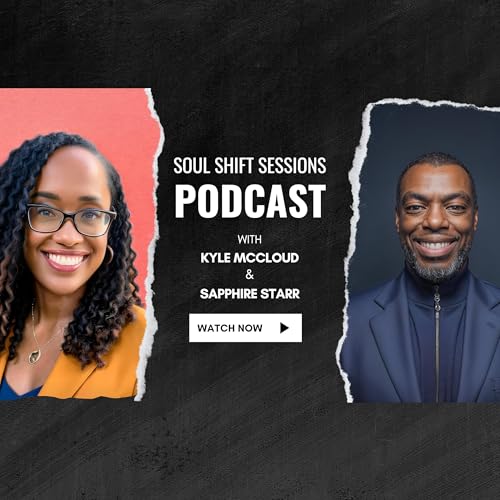
The Power of the Pivot: How to Embrace Change and Thrive
カートのアイテムが多すぎます
ご購入は五十タイトルがカートに入っている場合のみです。
カートに追加できませんでした。
しばらく経ってから再度お試しください。
ウィッシュリストに追加できませんでした。
しばらく経ってから再度お試しください。
ほしい物リストの削除に失敗しました。
しばらく経ってから再度お試しください。
ポッドキャストのフォローに失敗しました
ポッドキャストのフォロー解除に失敗しました
-
ナレーター:
-
著者:
このコンテンツについて
In this episode, "The Power of the Pivot: How to Embrace Change and Thrive," features hosts Coach Kyle McCloud and Coach Sapphire Star discussing the concepts of change and pivoting.
Key discussion points include:
- Defining Change and Pivoting: Kyle initially expresses his dislike for change, identifying as a creature of habit who seeks structure when faced with inevitable changes. Sapphire differentiates pivoting from change, explaining that pivoting is a conscious choice to alter direction when a current strategy isn't working, often requiring overcoming self-doubt and attachment to the original plan.
- Personal Experiences with Pivoting: Both hosts share personal stories to illustrate their points. Kyle discusses the logistical challenges he faced after his father's passing, which forced him into a period of intense task orientation. Sapphire shares her experience with divorce, highlighting the societal pressures and internal struggles she faced in accepting that her initial "happily ever after" plan wasn't working and making the decision to move on from a toxic relationship.
- Navigating Pivots and Thriving: The hosts emphasize that pivoting, while not always fun, involves taking one step at a time. They touch upon the societal perception of "failure" associated with major life changes like divorce and the internal conflict arising from personal beliefs, particularly those influenced by religious upbringing. Despite the difficulties, they assert that these challenging experiences often lead to unexpected positive outcomes, such as new relationships and opportunities.
- Challenges and Mindset: They discuss how being in the midst of a pivot can make it difficult to recognize that one is actually thriving. Sapphire shares an anecdote about losing power for three days and choosing a positive perception over despair, highlighting the importance of shifting mindset. Kyle emphasizes the value of having supportive individuals in one's life who can offer guidance and "check" one's perspective during difficult times.
- Forgiveness and Self-Compassion: A crucial aspect of embracing change is forgiveness, especially self-forgiveness. The hosts argue that society often trains individuals to be self-critical and that it's essential to "let yourself off the hook" by recognizing that past decisions were made with the best available information and emotional maturity at the time.
- The Power of Now and Choice: They stress the importance of being present and focusing on the "now" rather than constantly looking ahead. The conversation repeatedly returns to the theme of choice—how beliefs and thoughts influence actions and results, and that pivoting is a deliberate choice to break limiting cycles.
- Making Decisions and Taking Action: The hosts discuss the human desire for a "crystal ball" to ensure correct decisions. Kyle introduces the idea of proceeding with a decision if one is 70% sure it will work out, while Sapphire counters that her approach involves "burning the ships"—committing fully once a decision is made, with no thought of retreat.
- Financial Pivots and Mindset: The conversation shifts to financial well-being, noting that financial challenges are often symptoms of deeper issues like limiting beliefs rooted in childhood experiences or societal conditioning. They advocate for shifting from a scarcity to an abundance mindset and being intentional about language around money, especially with children.
- Proactive vs. Reactive: The episode concludes by emphasizing the importance of being proactive rather than reactive in life's circumstances. Kyle shares his quote: "Life is 10% of what happens to you and 90% of how you respond to it," leading to a debate about whether reactions are always a choice, even if one isn't consciously aware of making them. Ultimately, they agree that pivoting requires change, choice, forgiveness, and taking action, and that it's up to each individual to decide whether to be proactive or reactive.
まだレビューはありません



